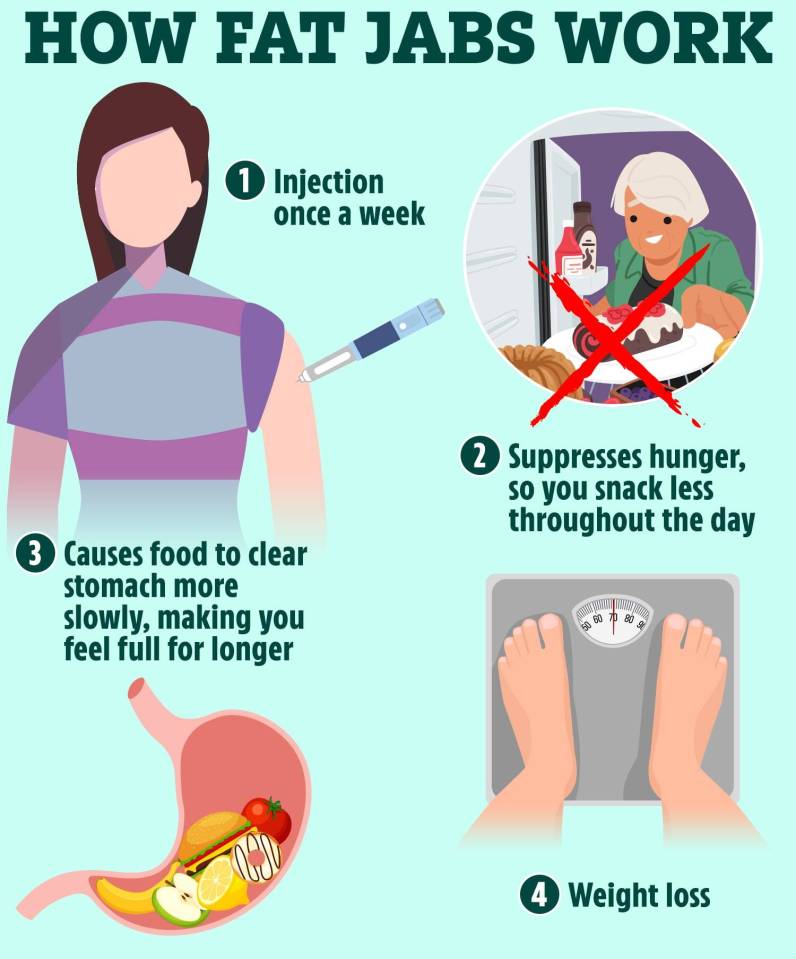FAT jabs do often sound like a magical quick fix to overeating and demanding hunger pangs.
But the drugs can leave some users feeling seriously unwell and many in hospital.
2
Monitoring Facebook posts could be a useful way to spot side effects that might be unknown, scientists say (Credit: Getty)
After scouring social media, scientists have found the most common side effects of the popular fat-busting meds.
Vomiting, nausea and headaches are the most talked-about side effects of the jabs, according to the new study, which analysed thousands of Facebook posts.
The US researchers looked at how people in the US were discussing GLP-1 drugs like Wegovy, Ozempic, and Mounjaro on public pages.
They found that gut issues were the most frequently mentioned side effects overall, especially among users of semaglutide (the active ingredient in Wegovy and Ozempic) and tirzepatide (the active ingredient in Mounjaro).
Mental health concerns like anxiety and depression were also raised, but far less frequently.
The study, published in JMIR Infodemiology, found that vomiting was most often mentioned in posts about Mounjaro, at 3.8 per cent.
Meanwhile, Wegovy users mentioned depression more than any other group, with 1.57 per cent of posts referencing the symptom.
The drugs, originally developed for type 2 diabetes, have soared in popularity thanks to their dramatic weight-loss effects, with celebs like Oprah Winfrey and Sharon Osbourne singing their praises.
But they’ve also been linked to less glamorous side effects, such as joint pain, fatigue, hair loss, and in some cases, gallbladder problems.
Despite the risks, experts say the drugs are still safe and effective for most patients.
Weight Loss Jabs – Pros vs Cons
They help control blood sugar, trigger rapid weight loss, and cut the risk of dying from heart disease by around a fifth in people with obesity or type 2 diabetes.
Roughly 1.5million people in the UK are now taking GLP-1 drugs, which have been hailed by some as game-changers in the fight against obesity.
In the US, this number is even higher, with over 2 per cent of the population, approximately 4 million people, currently using these medications for weight loss.
But health officials warn they are not a silver bullet and can come with side effects.
The scientists found these effects varied by brand.
Zepbound, a newer tirzepatide drug which is approved in the US but not the UK, was linked more often to high blood pressure,
While Ozempic posts mentioned gallbladder issues most. Ozempic is approved for weight loss in the US but is only approved for diabetes in the UK.
Scientists from the University of Maryland, who are behind the study, analysed nearly 60,000 unique public Facebook posts uploaded by US users of the medicines between 2022 and 2024.
They used cluster analysis to map out which symptoms were often mentioned together.
They found that vomiting, nausea and pancreatitis – a condition where the pancreas becomes inflamed – often came hand in hand, while anxiety frequently appeared alongside depression and fatigue.
Posts about side effects spiked after major events including the US Food and Drug Administration approving Wegovy for teens, celebrity endorsements, and wider insurance coverage in the US.
2
Despite these increases, the proportion of people talking about side effects actually dropped over time.
Scientists say monitoring social media could be a useful way to spot side effects that might be missed or underreported in clinical trials.
But they warned that Facebook posts don’t tell the full story as symptoms were self-reported, which means they can be exaggerated or incomplete.
There is also no way to verify dosage, how long people were on the drugs, or even whether they were using genuine products.
Everything you need to know about fat jabs
Weight loss jabs are all the rage as studies and patient stories reveal they help people shed flab at almost unbelievable rates, as well as appearing to reduce the risk of serious diseases.
Wegovy – a modified version of type 2 diabetes drug Ozempic – and Mounjaro are the leading weight loss injections used in the UK.
Wegovy, real name semaglutide, has been used on the NHS for years while Mounjaro (tirzepatide) is a newer and more powerful addition to the market.
Mounjaro accounts for most private prescriptions for weight loss and is set to join Wegovy as an NHS staple this year.
How do they work?
The jabs work by suppressing your appetite, making you eat less so your body burns fat for energy instead and you lose weight.
They do this my mimicking a hormone called GLP-1, which signals to the brain when the stomach is full, so the drugs are officially called GLP-1 receptor agonists.
They slow down digestion and increase insulin production, lowering blood sugar, which is why they were first developed to treat type 2 diabetes in which patients’ sugar levels are too high.
Can I get them?
NHS prescriptions of weight loss drugs, mainly Wegovy and an older version called Saxenda (chemical name liraglutide), are controlled through specialist weight loss clinics.
Typically a patient will have to have a body mass index (BMI) of 30 or higher, classifying them as medically obese, and also have a weight-related health condition such as high blood pressure.
GPs generally do not prescribe the drugs for weight loss.
Private prescribers offer the jabs, most commonly Mounjaro, to anyone who is obese (BMI of 30+) or overweight (BMI 25-30) with a weight-related health risk.
Private pharmacies have been rapped for handing them out too easily and video calls or face-to-face appointments are now mandatory to check a patient is being truthful about their size and health.
Are there any risks?
Yes – side effects are common but most are relatively mild.
Around half of people taking the drug experience gut issues, including sickness, bloating, acid reflux, constipation and diarrhoea.
Dr Sarah Jarvis, GP and clinical consultant at patient.info, said: “One of the more uncommon side effects is severe acute pancreatitis, which is extremely painful and happens to one in 500 people.”
Other uncommon side effects include altered taste, kidney problems, allergic reactions, gallbladder problems and hypoglycemia.
Evidence has so far been inconclusive about whether the injections are damaging to patients’ mental health.
Figures obtained by The Sun show that, up to January 2025, 85 patient deaths in the UK were suspected to be linked to the medicines.



